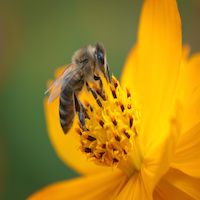Article
Dangers of Bee Venom Therapy
Author(s):
A new meta-study of bee venom therapy finds considerable risk of anaphylaxis and other reactions, concluding that only experts should offer it to patients.

A new meta-study of bee venom therapy finds considerable risk of anaphylaxis and other reactions, concluding that only experts should offer it to patients.
Researchers from two South Korean universities and the country’s National Institute of Health began with 145 papers that ranged from randomized controlled trials to single-patient case studies.
Several of those papers evaluated immunotherapy programs designed to reduce or eliminate existing bee venom allergies. Others evaluated treatments that used bee venom to alleviate some immune related diseases, chronic recalcitrant neuralgia, arthralgia, and musculoskeletal conditions, such as arthritis and rheumatism.
Randomized controlled trials collectively found that the most common of those therapeutic treatments, bee venom acupuncture, was associated with a 361% greater risk of adverse events than regular acupuncture (relative risk [RR], 3.61; 95% confidence interval [CI], 2.10-6.20). The researchers noted that the poor reporting quality of the underlying trials made it difficult to provide a narrower estimate of patient risk.
There was evidence indicating that the incidence and severity of adverse effects varied in proportion to the amount of venom used on the needles, but the studies were not large enough to allow for accurate measurement of that variance.
Research on venom immunotherapy also found significant risk. Overall, 28.87% of the 4,844 patients monitored in 46 different studies experienced adverse events. Systematic reactions occurred in 681 of those patients (14.06%).
A closer look at the results found both reason for concern and reason for hope. Previous meta-studies of immunotherapy have found systematic reaction rates between 11.5% and 11.8%, the authors of the new study wrote, so it was possible that the growing use of immunotherapy has led to a reduction in the average quality of care.
On the other hand, some individual immunotherapy studies found almost no systemic reactions, so it may well be possible for practitioners to adopt techniques that almost eliminate the danger associated with the procedure.
Among the most surprising findings of the study was the similarity of adverse events among patients who were using bee venom to reduce existing allergies and those who were using it to treat other conditions.
“In most randomized controlled trials and randomized crossover trials with bee sting acupuncture and bee venom acupuncture, participants were included if they showed negative responses in skin tests, whereas participants were included in venom immunotherapy case studies and case series if they showed positive responses in skin tests,” the researchers wrote in PLOS One. “This difference in the participants included in each type of study does not seem to be directly related to the adverse events related to bee venom therapy.”
In other words, people who were selected for studies because they showed no allergy to bee venom were no more likely to suffer adverse effects from venom than people who were selected for studies because they did show an allergy to bee venom.
Patients who initially tested negative for venom allergies, moreover, were far more likely than those who did not suffer anaphylaxis from venom exposure.
Indeed, anaphylaxis ranked among the most common severe reactions in acupuncture studies but it was very rare in immunotherapy studies. (Venom acupuncture involved much more exposure than immunotherapy, but the researchers emphasized the finding to warn treatment providers that they must be prepared for reactions, even when working on patients with no evident venom sensitivity.)
“Adverse events related to bee venom therapy are not uncommon,” the researchers wrote. “Therefore, practitioners should pay careful attention to the incidence of adverse events and patterns of adverse event occurrence in their patients. Additionally, education and qualification of practitioners should be ensured based on appropriate training programs and clinical guidelines for monitoring of adverse events related to bee venom acupuncture and bee sting acupuncture.”





